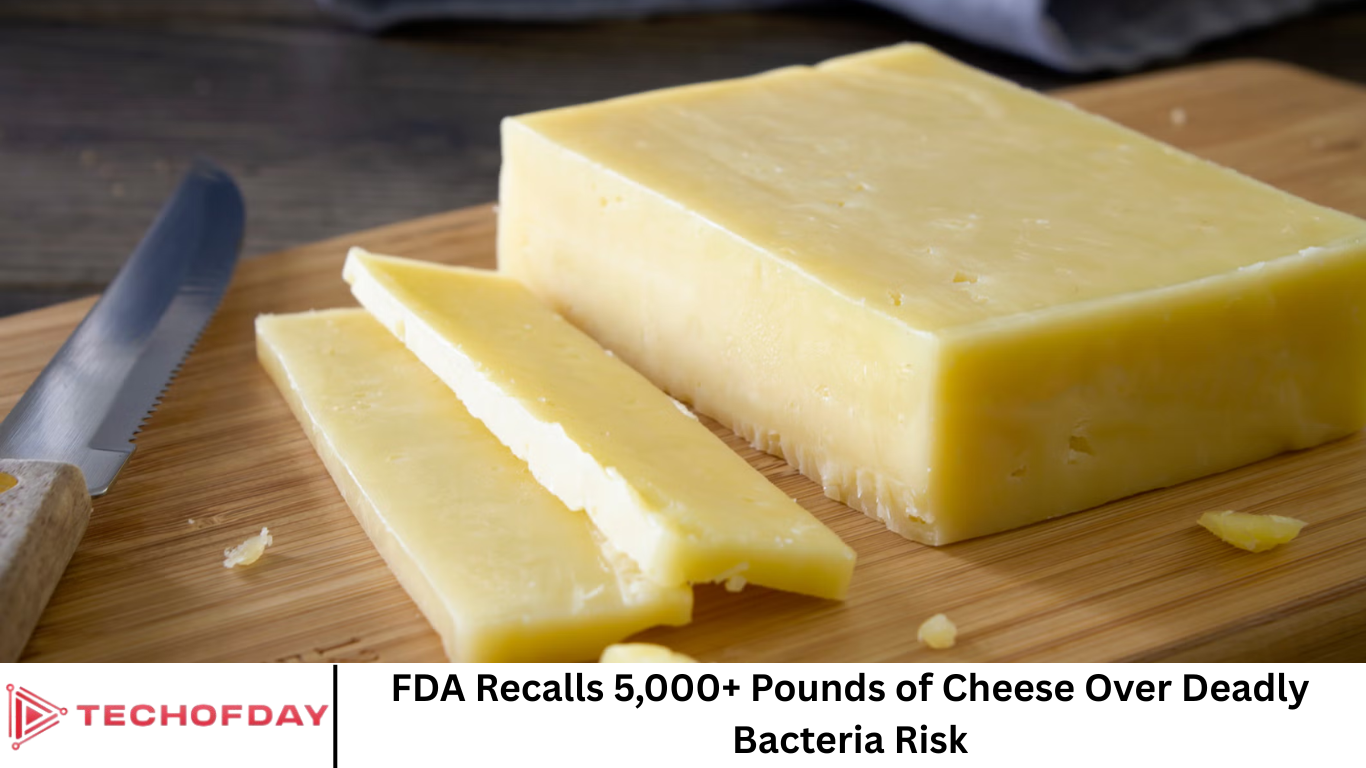FDA Recalls 5,000+ Pounds of Cheese Over Deadly Bacteria Risk

In a startling development that has raised alarms among health officials and consumers alike, the U.S. Food and Drug Administration (FDA) has issued a nationwide recall of over 5,000 pounds of cheese due to potential contamination by Listeria monocytogenes, a harmful bacterium that can cause severe, and sometimes fatal, infections.
The recall affects a range of cheese products distributed across multiple states and has serious implications for food safety standards and public health vigilance. This recall, which stems from environmental contamination in the production facility.
Highlights how even routine dairy products can pose unexpected health hazards. With rising consumer concern and increasing scrutiny over food handling practices, this event has once again spotlighted the importance of food safety protocols from farm to table.
The Details of the Recall
What Happened?
The FDA recall involves a range of cheese products from a manufacturer whose routine quality control process identified the presence of Listeria monocytogenes on surfaces that come into contact with food. The company acted swiftly, halting production and initiating the recall process to prevent any public exposure.
More than 5,000 pounds of cheese—specifically soft and semi-soft varieties including Pepper Jack, Monterey Jack, Horseradish, and Farmers Cheese—were pulled from shelves. The affected products were sold in a variety of package sizes and distributed to several grocery chains and independent retailers.
While no illnesses have been reported as of the recall date, the presence of Listeria poses a high enough risk to justify immediate action.
Understanding Listeria: A Silent Danger
What Is Listeria monocytogenes?
Listeria monocytogenes is a type of bacteria found in soil, water, and some animals, including cattle and poultry. It can be transferred to food products during processing or packaging, especially in environments that are not properly sanitized.
Unlike many other foodborne bacteria, Listeria can survive and even thrive at refrigerator temperatures, making it particularly insidious.
Health Risks of Listeria Contamination
Infection from Listeria, known as listeriosis, can cause:
- Fever
- Muscle aches
- Nausea or diarrhea
- Headache
- Confusion
- Convulsions
While these symptoms may appear mild in healthy adults, the stakes are much higher for certain groups:
- Pregnant individuals: Listeria can lead to miscarriage, stillbirth, or premature delivery.
- Infants and children: Vulnerable to severe illness or developmental complications.
- Elderly people and those with weakened immune systems: Risk of meningitis, sepsis, and even death.
The Centers for Disease Control and Prevention (CDC) estimates that about 1,600 people contract listeriosis annually in the U.S., and approximately 260 die from it—making it one of the most lethal foodborne illnesses.
The Timeline of the Incident
Discovery and Response
The issue was first identified during routine environmental testing within the cheese production facility. Samples from equipment and surfaces came back positive for Listeria monocytogenes. While no contamination was found directly in the cheese products themselves at first, the potential for cross-contamination prompted a comprehensive recall out of an abundance of caution.
The cheese manufacturer, in coordination with the FDA, issued a voluntary recall and immediately shut down operations to conduct a thorough cleaning and sanitation process. Investigations are ongoing to determine the root cause and ensure it doesn’t recur.
Distribution and Exposure
The cheese was distributed across several states in retail locations, mainly in the Midwest and East Coast. It was sold under various brand labels, making it difficult for some consumers to identify affected products.
Customers were urged to check batch numbers and “best by” dates listed in the recall notice and discard any suspect cheese immediately. Refunds were offered, and customer service hotlines were established to provide assistance.
The Role of the FDA and Preventive Measures
Regulation and Oversight
The FDA plays a central role in regulating food safety in the U.S. It has stringent guidelines on microbial testing, sanitation protocols, and recall procedures. When a food producer identifies a potential risk, it must report the issue to the FDA and initiate a recall if necessary.
In this case, the FDA’s recall procedures were followed, and the public was alerted through both media outlets and direct notifications to retailers.
Preventing Listeria in Dairy Products
To prevent Listeria contamination, producers must:
- Maintain strict hygiene in processing environments
- Conduct routine testing on surfaces and equipment
- Separate raw and finished products
- Regularly clean and sanitize all food-contact surfaces
- Use pasteurization to kill bacteria in milk-based products
Consumers, too, can play a role by:
- Storing cheese at appropriate temperatures
- Avoiding expired or damaged packaging
- Washing hands and utensils before handling food
Impact on the Food Industry
Consumer Trust at Stake
Recalls like this one can erode consumer trust, particularly in categories like dairy where people expect high safety standards. The cheese industry has long enjoyed a reputation for quality and tradition, but recurring contamination events—no matter how isolated—threaten that image.
In response, many companies are now investing in more robust quality control systems and are becoming more transparent with the public regarding their handling processes.
Financial Repercussions
Product recalls come with heavy costs: not only in the form of direct losses from unsellable goods, but also from litigation, loss of reputation, and disruption of business. Smaller producers, in particular, may find it difficult to recover.
How to Know If You Have a Recalled Product
Consumers can identify affected cheese by checking the batch codes, manufacture dates, and “best by” labels published in the official recall notice. If you’re unsure whether your cheese is part of the recall:
- Stop eating it immediately
- Contact the store where it was purchased
- Call the manufacturer’s recall hotline
- Visit the FDA’s website for updates
This recall is a stark reminder of how crucial food safety measures are—not just for producers but for consumers as well. Even the most trusted foods can be compromised when hygiene or environmental controls slip.
Lessons Learned and Future Prevention
The key lessons include:
- Importance of routine environmental testing
- Need for proactive transparency
- Public awareness of foodborne illness symptoms
- Continuous investments in safety technologies
Consumers, meanwhile, should stay informed and cautious, particularly when purchasing products that are more vulnerable to bacterial growth like soft cheeses, deli meats, and ready-to-eat meals.
Frequently Asked Question
What types of cheese were recalled?
The recall includes various soft and semi-soft cheeses such as:
- Pepper Jack
- Monterey Jack
- Horseradish Cheese
- Farmers Cheese
These were sold in different sizes and packaging formats.
What is Listeria and why is it dangerous?
Listeria monocytogenes is a harmful bacterium that can cause serious illness called listeriosis. It’s especially dangerous to pregnant women, newborns, elderly people, and those with weakened immune systems.
How do I know if I have a recalled product?
Check the packaging for batch numbers, expiration dates, or “best by” dates. The FDA website provides full details. If in doubt, throw it out or contact the store where you bought it.
What should I do if I’ve already eaten the cheese?
If you’ve consumed the recalled product, monitor your health for symptoms such as fever, nausea, vomiting, or confusion—especially if you’re in a high-risk group. Seek medical attention if symptoms appear.
Has anyone gotten sick from this cheese?
As of the latest reports, no illnesses have been confirmed in connection with the recalled cheese. The recall is a precaution to prevent possible cases.
Why are soft cheeses more prone to Listeria?
Soft cheeses retain more moisture and have a higher pH, creating an ideal environment for bacterial growth. Unlike hard cheeses, they’re more vulnerable to contamination, especially if not pasteurized.
How can I protect myself from Listeria in the future?
- Always check product recalls regularly
- Avoid unpasteurized dairy products
- Store cheese properly in the fridge
- Clean cutting boards and knives after contact with cheese
- Heat ready-to-eat items before consuming if you’re in a high-risk group
Conclusion
The FDA’s recall of over 5,000 pounds of cheese serves as a critical warning about the hidden dangers of Listeria contamination. While no illnesses have yet been reported, the potential for severe infection means that action must be taken swiftly—and in this case, it was. For consumers, this event is a valuable reminder to stay informed, check labels carefully, and understand the risks associated with certain foods. For the food industry, it’s another wake-up call to maintain rigorous safety standards and ensure the trust and health of their customers.
